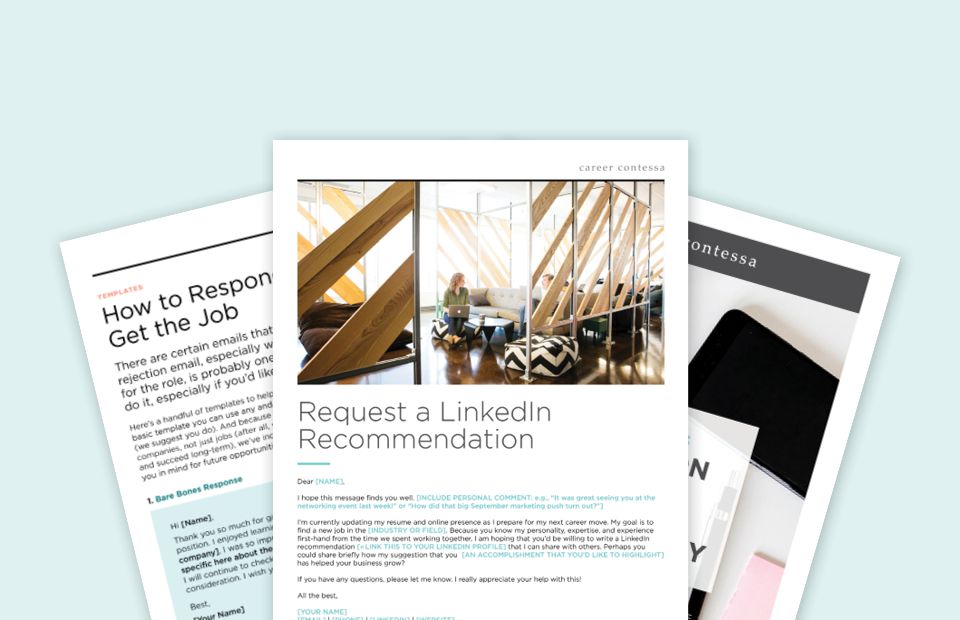Can you really launch a quick and successful job search while still employed?
But your job also pays good money, and you’re living an okay life on that salary. Besides, you don't really feel like faking one thousand doctor appointments or bringing your professional change of clothes for your interview.
It’s one thing to find a job when you’re unemployed. Sure, it’s terrifying—but when you have no choice and all the time in the world, you can dive into finding your next great gig with a sense of immediacy and purpose. However, the unemployed job search desperation can sometimes end in
an equally bad new job.
So, let's make moves to move on without deadlines or unpaid rent bills. After all, career experts agree that you should launch a job search while you're employed.
We asked a couple of
our coaches to give us their best pointers. Below, we’ve got a guide for how to run your job search successfully in just 90 days, all while working your full-time job. Happy hunting.
Weeks 1-4: Prepare Yourself for Job Hunting
Start Your New Job Search With a Soul Search
Set aside a few hours to do some soul-searching. You can’t be strategic about finding a better job if you don’t know exactly what you’re looking for (and what sort of position will make you happy)—and also what you don’t want.
Says Career Contessa mentor,
Alyson Garrido: “It's much easier to find the right fit if you know what you're looking for, not just focused on leaving a bad situation. Try looking at what's not going well and imagine what things you'd need to make you happy. Knowing what you want also helps your network help you.”
Before doing anything else, block out a couple of hours where you can spend some distraction-free time considering exactly what you want. We suggest a Saturday morning when you’re not distracted by other commitments. Jot down a few things:
- 1. Make a list of what you don’t like about your current job.
- 2. And a list of what you do like. Even if you hate your current role, there are aspects you like. Focus your next search on those.
- 3. And your job must-haves (benefits?), good-to-haves (flexible hours?), and not-a-big-deals (nap pods, ping pong tables…).
Do Your Company Research
Do some research into
company cultures that fit your needs. The last thing you want is to end up somewhere exactly like your current employers.
Take what you learned during your soul search and put it to work when researching potential companies. If you need a better work-life balance, then look out for red flags in the job post or interview. Prioritize your established values and priorities.
Pro Tip: Don’t do this research at work! In fact, keep all of your job search activities off the company computer. That means completing LinkedIn profile updates, job applications, and job sites scouring off the current clock. Conduct your job search solely on your personal devices to avoid alerts popping up on your screen.
Another Pro Tip: That being said, as long as you are conducting your job search "on the up and up," try not to get paranoid about suspicions from your co-workers or your current boss.
Time to Update (and Optimize) Everything
Many people start a job search by immediately updating their resume. But waiting until after you’ve done an exploratory phase means that you can tweak your updates to reflect exactly the sort of job and companies you’re targeting.
Now that you know what you want (and what you don’t), play up the parts of your
resume that you want to take priority—and remove skills and expertise that don't apply to the roles you’re after.
Spend a weekend aligning your resume and LinkedIn and editing (or writing)
a killer personal summary. One thing to keep in mind, though, says Garrido: “Be sure to turn off notifications so your network isn't emailed every time you make a modification. That's a red flag to your boss and colleagues if you're not someone who is regularly updating their info.” This will keep your job search on the DL while you’re still at your current company.
Last but not least, update your personal portfolio. If you don’t have one, we think you should.
Here’s our argument why.
Network, Network, Network
Well, it applies here too. So spend only 20 percent of your time applying directly to job postings. Spend the other 80 percent of your job search
getting creative and finding ins.
Now that you know what you want and everything’s updated, it’s time to take advantage of your greatest asset: your network. Says Garrido: “A 90-day exit would be very difficult if you are relying on job boards and online applications. Don't be afraid to reach out."
Your friends, family, and colleagues really want to help. We tend to be quick to offer and provide help, but we forget that people are also willing to lend a hand. It's your job to make the ask.
If you’re worried about being discreet, going through people you trust has an added bonus: “You won't have to wonder if you're sending your resume to someone your current boss or a coworker knows,” says Garrido.
Now is also a good time to start looking into events and
networking opportunities around you where you can start to expand the network you already have. Expanding your professional network is a great way to reach new opportunities without doing what we call the “Spray and Pray,” or applying for every job opening you find without employing any strategy.
Weeks 5-8: The Take Charge Period
Master Those Initial Phone Interviews
It probably goes without saying but: you want the perfect job for you, not the first job offer you get. Spend the next month taking any and all
phone interviews that interest you, but make sure that you’re being as critical of the company and role as they are of you as a candidate.
That's right, schedule interviews no matter what. Even if the job doesn't interest you, it's practice. Plus, you never know what can come from meeting with a hiring manager—even if it's years down the line with another opportunity at a different organization.
Pro Tip: Remember that you are not desperate. It’s easy to feel desperate when you’re stuck in a job that you hate, but that’s just it—you have a job. That means you’re in a better position than someone who finds herself suddenly unemployed.
Make sure that you
prepare your personal pitch and tailor it to each interview you take. You need to be able to explain your
why as much as you need to explain who you are and what you’ve done. What makes you stand out?
Remember that
phone interviews with recruiters should be treated like standard interviews. Treat them as such.
To prepare for other interviews (after your successful phone interview), check out these tips for mastering different types of interviews.
Walk Into Your Interviews with a Custom Project
That's right, the
custom project. If you’ve applied for a position at one of your dream companies (even with a referral) but haven’t heard back, or if you’re facing an in-person interview in the coming weeks, consider a custom project. I have a friend who shifted industries and scored a higher position despite the change because she walked into her in-person interview with a mock marketing plan. Putting in extra work will all be worth it when you score the ideal job—and you’ll have the opportunity to show your skills rather than tell them. Key.
Weeks 9-12: The In-Person Interview Period
Focus on Giving Great Interview Answers
Be prepared
to explain why you’re on the hunt when you’re already gainfully employed. Stay focused on what you want to do next, and make sure you're leaving your current role for the right reasons. Recruiters will dig into reasons why you're looking to jump ship, so be laser-focused on why you're interviewing at the new company.
Don't Forget to Be Gracious
Many places appreciate a handwritten thank you note, and we know some people who have made hiring decisions based on notes they received. That being said, even if you intend to send a written note, make sure to email a thank you to your interviewer ASAP (we think you should do it by end of day, but definitely within 24 hours).
Near the End of 90 Days (If You’re Still Hunting)
By now, you’ve hopefully had multiple interviews and have some strong leads. But if you’re not getting as many responses as you’d like or you haven’t heard about an interview for a while, now’s a good time to reach out to your network again. They may not know that you’re still looking since a couple of months have passed.
So is a 90-day time frame actually reasonable? “Absolutely!” Garrido says. “It takes focus and determination. It is important to remember, though, that you are looking for the right job, not just any job. If you jump into something that isn't the right fit, you may be looking again sooner than later. Have faith that any effort is a step in the right direction and be nice to yourself.”












